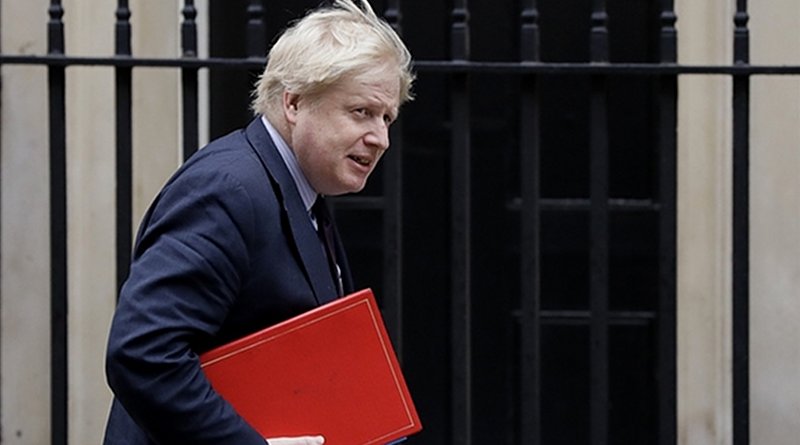Boris The Gambler Is Making His Riskiest Bet So Far – OpEd
By Arab News
By Andrew Hammond*
Boris Johnson told the British people last week that the coronavirus tide would turn in 12 weeks; such optimism is only his latest political gamble in the UK’s high-risk, outlier approach to tackling the virus in what could be a make-or-break period for his premiership.
Voters appear for now to approve of Johnson’s handling of the outbreak — 49 percent think the government is tackling the crisis well compared with 35 percent who believe it is handling it badly, and the prime minister personally is given the benefit of the doubt by 47 percent to 38 percent.
Public opinion aside, the big advantage Johnson has now is the significant House of Commons majority he won in December. The timing of that election was fortuitous for the prime minister, since it could have easily been postponed until this year, when Johnson would have been in a far tighter political spot running a minority government in what may yet turn out to be the nation’s biggest crisis since 1945, including a potentially deep recession.
Within the cabinet, too, Johnson is in the ascendant after his most recent reshuffle, and may now enjoy greater power as prime minister than any of his predecessors since Margaret Thatcher. Unlike Tony Blair, for instance, there is no obvious big counterweight to him in government, a Gordon Brown figure, so he dominates the political scene.
This means that emergency coronavirus legislation will soon be approved by Parliament, despite concern over the sweeping nature of the new powers, and their intended duration for two years despite Johnson’s insistence that the peak of the crisis will be in three months — a timeframe that the Chief Science Officer and Chief Medical Officer have refused to endorse.
Yet while Johnson may be at the peak of his political powers, the risky, outlying approach he is taking to this crisis could yet backfire. The UK’s strategy, designed to spread the outbreak over a longer period and reduce stress on the National Health Service, is out of kilter with countries that imposed restrictive measures much faster.
The danger for Johnson is that while there may be short-term advantages for the economy, the number of cases may surge anyway in coming weeks, overwhelming the NHS. If so, support for his approach and his leadership could erode fast.
This strategy, which the prime minister insists is based on scientific advice, also underlines what appears to be a strong risk-taking streak in his style of political leadership. Whether one thinks he is a political genius or a clown, his period in office has been notable for a remarkable series of political gambles, of which this is only the latest.
These range from his “scorched earth” approach to Brexit, including a high-stakes decision last autumn to prorogue parliament that was over-ruled by the Supreme Court; and his push for a pre-Christmas election, the first in December for a century, at a time of extraordinary political volatility.
So far his gambles have generally paid off, including his big win in December, but the coronavirus may be his toughest opponent yet in the highest stakes battle of them all — life and death itself.
While the outcome of this latest risk-taking may not be known for months, what is already clear is that it will have a displacement effect upon his wider political agenda for 2020.
The next phase of Brexit could become the most high-profile political casualty. While London and Brussels have begun negotiations on an EU-UK trade deal, talks have been halted by the virus crisis (indeed the EU’s chief negotiator Michel Barnier is infected and his UK counterpart Martin Frost is in self-isolation).
Even before the outbreak began, the 10-month period from March to December was not likely to be nearly long enough to reach more than what Barnier has called a “bare bones” UK-EU trade agreement, and not the extensive deal promised by some Brexiteers in 2016. But Johnson refuses to countenance a transition period extension.
This threatens what even Brexit Party leader Nigel Farage has called the likelihood of a new crisis by the summer, when both sides need to decide if there will be an extended transition into 2021. So there is growing pressure on Johnson, especially with the probability of a UK recession this year, to avoid the threat of a new cliff edge in negotiations and the threat of a no-deal Brexit raising its head again in the second half of 2020.
This all underlines how much the coronavirus outbreak has the potential to reshape UK politics. While Johnson is at peak power, he could yet come crashing back down to earth with a resurgence of political and economic uncertainty.
- Andrew Hammond is an Associate at LSE IDEAS at the London School of Economics

